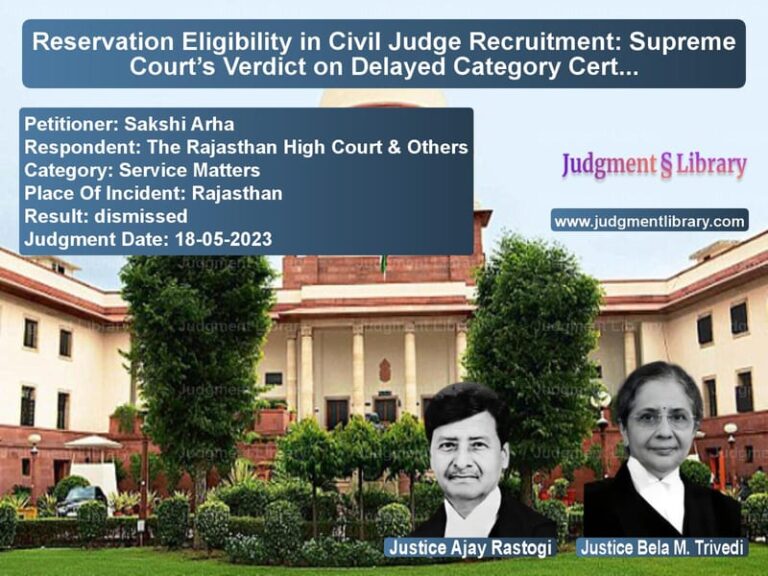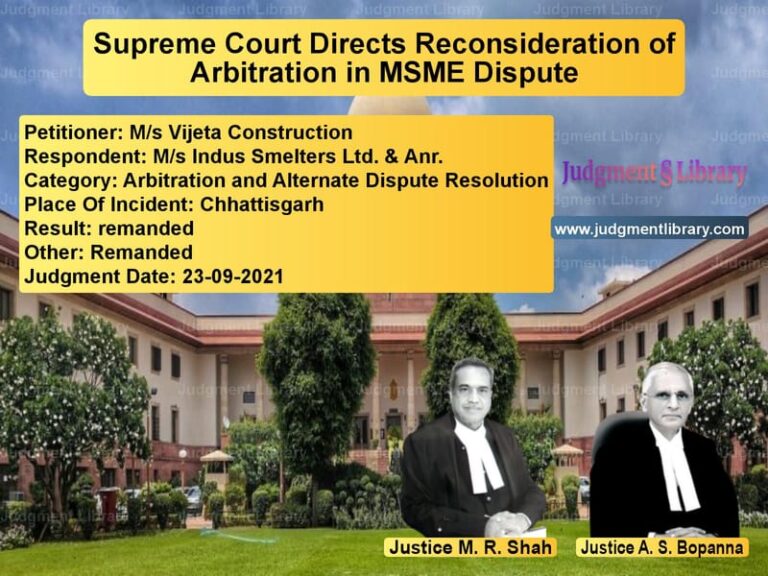Workmen Compensation and Disability: Supreme Court’s Ruling on Total Disablement for Drivers
The case of Arjun vs. IFFCO Tokio General Insurance Co. Ltd. & Anr. is a significant judgment regarding workmen’s compensation and the classification of disability in workplace accidents. The Supreme Court had to determine whether the amputation of a driver’s right upper limb constituted total disablement under the Employees Compensation Act, 1923.
The ruling clarifies the criteria for assessing disablement in cases where the nature of employment is directly impacted by a physical impairment, setting an important precedent for workmen’s compensation cases.
Background of the Case
The appellant, Arjun, was employed as a driver of a goods carrier auto-rickshaw. On 18th February 2009, while driving, he noticed a pothole on the road and applied brakes. This caused the vehicle to go out of control and overturn, leading to severe injuries. His injuries resulted in the amputation of his right upper limb above the wrist joint.
Following this, he filed a compensation claim under the Employees Compensation Act, 1923 (previously known as the Workmen’s Compensation Act, 1923). His primary argument was that due to the amputation, he had completely lost the capacity to drive and had suffered total disablement. The Commissioner for Workmen’s Compensation ruled in his favor, awarding compensation on the basis of total disability.
The insurance company, IFFCO Tokio General Insurance, appealed the decision to the High Court, which partially allowed the appeal, reducing the disability classification from total disablement (100%) to partial disablement (70%). Consequently, the compensation amount was reduced. The appellant then approached the Supreme Court.
Legal Dispute Over Disability Classification
The core issue before the Supreme Court was whether the amputation of a driver’s right upper limb should be considered total disablement or partial disablement under the Employees Compensation Act.
Relevant Legal Provisions
- Section 2(1)(l) of the Employees Compensation Act, 1923: Defines ‘total disablement’ as a disablement “whether of a temporary or permanent nature, which incapacitates a workman for all work which he was capable of performing at the time of the accident.”
- Section 4 of the Act: Outlines the compensation to be provided based on the level of disablement.
Arguments Before the Supreme Court
Appellant’s Arguments
The appellant’s counsel argued:
- The amputation of his right upper limb made him permanently unfit for driving.
- The definition of total disablement under the Act applies to his case because he is unable to perform the work he was engaged in at the time of the accident.
- Precedents such as Pratap Narain Singh Deo vs. Srinivas Sabata & Anr. (1976) and K. Janardhan vs. United India Insurance Co. Ltd. (2008) supported the view that if a person is unable to perform the specific work for which they were employed, it should be considered total disablement.
Respondent’s Arguments
The insurance company argued:
- The medical report classified the disability as 40% partial permanent disability.
- Section 4 of the Act is mandatory, and as per the law, the injury should be treated as partial disability, not total disablement.
- The appellant did not possess a commercial driving license, which would disqualify him from receiving compensation as a driver.
Supreme Court’s Judgment
The Supreme Court ruled in favor of the appellant, restoring the Commissioner for Workmen’s Compensation’s decision. The key findings were:
- The definition of total disablement under Section 2(1)(l) applies when an individual is completely incapacitated from performing the work they were engaged in at the time of the accident.
- The medical report stated that the appellant had suffered functional loss of 100% in his right upper limb, making him permanently unfit to work as a driver.
- The High Court erred in reducing the disability to 70% when the appellant had lost the ability to perform his job entirely.
- The insurance company’s argument regarding the appellant’s lack of a commercial driving license was irrelevant, as the High Court had already upheld the insurer’s liability to pay compensation.
The Supreme Court observed:
“The disablement has incapacitated him from doing the work which he was capable of doing. The said work was of driving a vehicle. Therefore, the learned Commissioner for Workmen’s Compensation was right in holding that the disability of the appellant will have to be treated as 100% disability.”
Key Observations from the Judgment
- Total disablement must be assessed based on the nature of the work the individual was engaged in at the time of the accident.
- A functional loss of a limb essential to performing a job should be classified as total disablement.
- The Supreme Court reaffirmed earlier rulings, reinforcing that the loss of an essential limb for one’s profession is sufficient to establish total disablement.
- Once liability to pay compensation is established, insurers cannot raise additional objections unrelated to the disability classification.
Impact of the Judgment
This judgment has significant implications for workmen’s compensation claims:
- For Workers: Employees who lose the ability to perform their specific job due to an accident are entitled to total disablement benefits.
- For Employers: The ruling reinforces the need for adequate insurance coverage for workplace injuries.
- For Insurance Companies: Insurers must assess disability based on the specific nature of the claimant’s job, not just general medical assessments.
- For Legal Precedents: The decision strengthens previous rulings affirming that disability classification must be job-specific.
Conclusion
The Supreme Court’s decision in Arjun vs. IFFCO Tokio General Insurance Co. Ltd. reinforces the importance of considering the nature of employment when determining workmen’s compensation claims. By ruling that the amputation of a driver’s right upper limb constitutes total disablement, the judgment ensures that workers who suffer job-ending injuries receive the compensation they are entitled to.
Read also: https://judgmentlibrary.com/cold-storage-insurance-claim-denied-supreme-court-upholds-policy-terms/
This ruling sets a critical precedent for future cases involving workplace injuries, particularly in professions where the loss of a limb directly impacts employability.
Petitioner Name: Arjun S/o. Ramanna @ Ramu.Respondent Name: IFFCO Tokio General Insurance Co. Ltd. & Anr..Judgment By: Justice Ajay Rastogi, Justice Abhay S. Oka.Place Of Incident: India.Judgment Date: 16-02-2022.
Don’t miss out on the full details! Download the complete judgment in PDF format below and gain valuable insights instantly!
Download Judgment: arjun-so.-ramanna-@-vs-iffco-tokio-general-supreme-court-of-india-judgment-dated-16-02-2022.pdf
Directly Download Judgment: Directly download this Judgment
See all petitions in Insurance Settlements
See all petitions in Other Insurance Cases
See all petitions in Judgment by Ajay Rastogi
See all petitions in Judgment by Abhay S. Oka
See all petitions in allowed
See all petitions in Quashed
See all petitions in supreme court of India judgments February 2022
See all petitions in 2022 judgments
See all posts in Insurance Cases Category
See all allowed petitions in Insurance Cases Category
See all Dismissed petitions in Insurance Cases Category
See all partially allowed petitions in Insurance Cases Category






